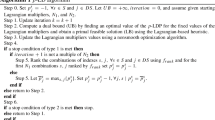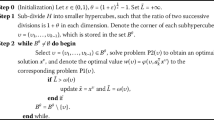Abstract
Nonconvex programming problems are frequently encountered in engineering and operations research. A large variety of global optimization algorithms have been proposed for the various classes of programming problems. A new approach for global optimum search is presented in this paper which involves a decomposition of the variable set into two sets —complicating and noncomplicating variables. This results in a decomposition of the constraint set leading to two subproblems. The decomposition of the original problem induces special structure in the resulting subproblems and a series of these subproblems are then solved, using the Generalized Benders' Decomposition technique, to determine the optimal solution. The key idea is to combine a judicious selection of the complicating variables with suitable transformations leading to subproblems which can attain their respective global solutions at each iteration. Mathematical properties of the proposed approach are presented. Even though the proposed approach cannot guarantee the determination of the global optimum, computational experience on a number of nonconvex QP, NLP and MINLP example problems indicates that a global optimum solution can be obtained from various starting points.
Similar content being viewed by others
References
A. Aggarwal and C.A. Floudas, Synthesis of general distillation sequences — nonsharp separations, Comput. Chem. Eng. (1990) in press.
F.A. Al-Khayyal, Jointly constrained bilinear programming and related problems, Technical Report Industrial and Systems Engineering Report Series, J-83-3, The Georgia Institute of Technology, Atlanta, GA (1983).
F.A. Al-Khayyal and J.E. Falk, Jointly constrained biconvex programming, Math. Oper. Res. 8(2) (1983) 273.
M. Avriel,Nonlinear Programming: Analysis and Methods (Prentice-Hall, Englewood Cliffs, NJ, 1976).
J.F. Benders, Partitioning procedures for solving mixed variables programming problems, Numer. Math. 4 (1962) 238.
A. Brooke, D. Kendrick and A. Meeraus,GAMS: A User's Guide (Scientific Press, Palo Alto, CA, 1988).
A.R. Colville, A comparative study of nonlinear programming codes, Technical Report IBM Scientific Report 320-2940, IBM, New York, NY (1968).
I. Czochralska, Bilinear programming, Appl. Math. 17(3) (1982) 495.
I. Czochralska, The method of bilinear programming for nonconvex quadratic programming, Appl. Math. 17(3) (1982) 515.
M.A. Duran and I.E. Grossmann, An outer-approximation algorithm for a class of mixed-integer nonlinear programs, Math. Prog. 36 (1986) 307.
J.E. Falk and K.R. Hoffman, A successive underestimation method for concave minimization problems, Math. Oper. Res. 1(3) (1976) 251.
J.E. Falk and R.M. Soland, An algorithm for separable nonconvex programming problems, Mgmt. Sci. 15(9) (1969) 550.
C.A. Floudas, A.R. Ciric and I.E. Grossmann, Automatic synthesis of heat exchanger networks, AIChE J. 32(2) (1986) 276.
C.A. Floudas, Separation synthesis of multicomponent feed streams into multicomponent product streams, AIChE J. 33(4) (1987) 540.
C.A. Floudas and A. Aggarwal, A decomposition strategy for the pooling problem, Oper. Res. J. Comput. (1990) accepted for publication.
C.A. Floudas, A. Aggarwal and A.R. Ciric, Global optimum search for nonconvex NLP and MINLP problems, Comput. Chem. Eng. 13(10) (1989) 1117.
C.A. Floudas and S.H. Anastasiadis, Synthesis of distillation sequences with several multicomponent feed and product streams, Chem. Eng. Sci. 43(9) (1988) 2419.
C.A. Floudas and A.R. Ciric, Global optimum issues on heat exchanger networks synthesis, in:Proc. 3rd Int. Symp. on Process Systems Engineering, Sydney, Australia (1988) p. 104.
C.A. Floudas and A.R. Ciric, Strategies for overcoming uncertainties in heat exchanger network synthesis, Comput. Chem. Eng. 13(10) (1989) 1133.
A.M. Geoffrion, Generalized Benders decomposition, J. Opt. Theory Appl. 10(4) (1972) 237.
P. Hansen, B. Jaumard and S.H. Lu, An analytical approach to global optimization, to appear in Math. Prog. (1990).
R. Horst, An algorithm for nonconvex programming problems, Math. Prog. 10 (1976) 312.
K. Kalantari and J.B. Rosen, An algorithm for global minimization of linearly constrained concave quadratic functions, Math. Oper. Res. 12(3) (1987) 544.
G.R. Kocis and I.E. Grossmann, Relaxation strategy for the structural optimization of process flow sheets, I&EC Res. 26(9) (1987) 1869.
G.R. Kocis and I.E. Grossmann, Global optimization of nonconvex MINLP problems in process synthesis, Ind. Eng. Chem. Res. 27(8) (1988) 1407.
H. Konno, A cutting plane algorithm for solving bilinear programs, Math. Prog. 11 (1976) 14.
H. Konno, Maximization of a convex quadratic function under linear constraints, Math. Prog. 11 (1976) 117.
P.F. Kough, The indefinite quadratic programming problem, Oper. Res. 27 (1979) 516.
R. Marsten,Users Manual for ZOOM/XMP, The Department of Management Information Systems, University of Arizona (1985).
R.K. Mueller, A method of solving the indefinite quadratic programming problem, Mgmt. Sci. 16(5) (1970) 333.
B.A. Murtagh and M.A. Saunders,MINOS5.0 Users Guide, Systems Optimization Laboratory, Dept. of Operations Research, Stanford University, CA (1986); Appendix A: MINOS5.1, Technical Report SOL 83-20.
P.M. Pardalos and J.B. Rosen,Constrained Global Optimization: Algorithms and Applications, Lecture Notes in Computer Science (Springer, 1987).
G.E. Paules IV and C.A. Floudas, APROS: algorithmic development methodology for discrete-continuous optimization problems, Oper. Res. 37(6) (1989) 902.
J.B. Rosen, Global minimization of a linearly constrained concave function by partition of feasible domain, Math. Oper. Res. 8(2) (1983) 215.
J.B. Rosen and P.M. Pardalos, Global minimization of large-scale constrained concave quadratic problems by separable programming, Math. Prog. 34 (1986) 163.
R.M. Soland, An algorithm for separable nonconvex programming problems II: nonconvex constraints, Mgmt. Sci. 17(11) (1971) 759.
N.V. Thoai and H. Tuy, Convergent algorithms for minimizing a concave function, Math. Oper. Res. 5(4) (1980) 556.
H. Tuy, Concave programming under linear constraints, Sov. Math. Doklady 5 (1964) 143.
H. Tuy, Global minimization of a difference of two convex functions, Math. Prog. Study 30 (1987) 150.
H. Vaish and C.M. Shetty, The bilinear programming problem, Naval Res. Log. Quarterly 23 (1976) 303.
R.R. Wehe and A.W. Westerberg, An algorithmic procedure for the synthesis of distillation sequences with bypass, Comput. Chem. Eng. 11(6) (1987) 619.
P.B. Zwart, Nonlinear programming: counterexamples to two global optimization algorithms, Oper. Res. 21 (1973) 1260.
P.B. Zwart, Global maximization of a convex function with linear inequality constraints, Oper. Res. 22 (1974) 602.
Author information
Authors and Affiliations
Rights and permissions
About this article
Cite this article
Aggarwal, A., Floudas, C.A. A decomposition approach for global optimum search in QP, NLP and MINLP problems. Ann Oper Res 25, 119–145 (1990). https://doi.org/10.1007/BF02283690
Issue Date:
DOI: https://doi.org/10.1007/BF02283690




